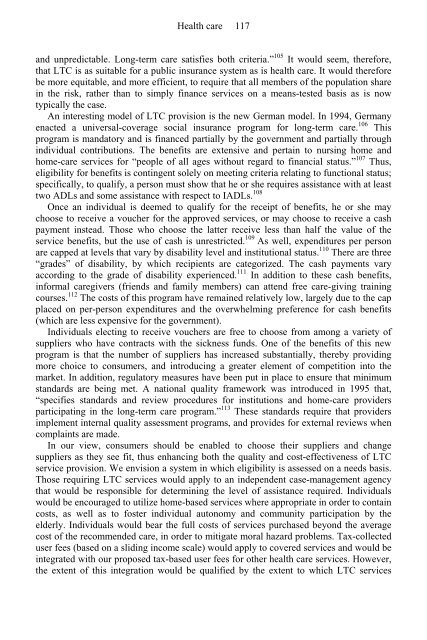Rethinking the Welfare State: The prospects for ... - e-Library
Rethinking the Welfare State: The prospects for ... - e-Library
Rethinking the Welfare State: The prospects for ... - e-Library
You also want an ePaper? Increase the reach of your titles
YUMPU automatically turns print PDFs into web optimized ePapers that Google loves.
Health care 117<br />
and unpredictable. Long-term care satisfies both criteria.” 105 It would seem, <strong>the</strong>re<strong>for</strong>e,<br />
that LTC is as suitable <strong>for</strong> a public insurance system as is health care. It would <strong>the</strong>re<strong>for</strong>e<br />
be more equitable, and more efficient, to require that all members of <strong>the</strong> population share<br />
in <strong>the</strong> risk, ra<strong>the</strong>r than to simply finance services on a means-tested basis as is now<br />
typically <strong>the</strong> case.<br />
An interesting model of LTC provision is <strong>the</strong> new German model. In 1994, Germany<br />
enacted a universal-coverage social insurance program <strong>for</strong> long-term care. 106 This<br />
program is mandatory and is financed partially by <strong>the</strong> government and partially through<br />
individual contributions. <strong>The</strong> benefits are extensive and pertain to nursing home and<br />
home-care services <strong>for</strong> “people of all ages without regard to financial status.” 107 Thus,<br />
eligibility <strong>for</strong> benefits is contingent solely on meeting criteria relating to functional status;<br />
specifically, to qualify, a person must show that he or she requires assistance with at least<br />
two ADLs and some assistance with respect to IADLs. 108<br />
Once an individual is deemed to qualify <strong>for</strong> <strong>the</strong> receipt of benefits, he or she may<br />
choose to receive a voucher <strong>for</strong> <strong>the</strong> approved services, or may choose to receive a cash<br />
payment instead. Those who choose <strong>the</strong> latter receive less than half <strong>the</strong> value of <strong>the</strong><br />
service benefits, but <strong>the</strong> use of cash is unrestricted. 109 As well, expenditures per person<br />
are capped at levels that vary by disability level and institutional status. 110 <strong>The</strong>re are three<br />
“grades” of disability, by which recipients are categorized. <strong>The</strong> cash payments vary<br />
according to <strong>the</strong> grade of disability experienced. 111 In addition to <strong>the</strong>se cash benefits,<br />
in<strong>for</strong>mal caregivers (friends and family members) can attend free care-giving training<br />
courses. 112 <strong>The</strong> costs of this program have remained relatively low, largely due to <strong>the</strong> cap<br />
placed on per-person expenditures and <strong>the</strong> overwhelming preference <strong>for</strong> cash benefits<br />
(which are less expensive <strong>for</strong> <strong>the</strong> government).<br />
Individuals electing to receive vouchers are free to choose from among a variety of<br />
suppliers who have contracts with <strong>the</strong> sickness funds. One of <strong>the</strong> benefits of this new<br />
program is that <strong>the</strong> number of suppliers has increased substantially, <strong>the</strong>reby providing<br />
more choice to consumers, and introducing a greater element of competition into <strong>the</strong><br />
market. In addition, regulatory measures have been put in place to ensure that minimum<br />
standards are being met. A national quality framework was introduced in 1995 that,<br />
“specifies standards and review procedures <strong>for</strong> institutions and home-care providers<br />
participating in <strong>the</strong> long-term care program.” 113 <strong>The</strong>se standards require that providers<br />
implement internal quality assessment programs, and provides <strong>for</strong> external reviews when<br />
complaints are made.<br />
In our view, consumers should be enabled to choose <strong>the</strong>ir suppliers and change<br />
suppliers as <strong>the</strong>y see fit, thus enhancing both <strong>the</strong> quality and cost-effectiveness of LTC<br />
service provision. We envision a system in which eligibility is assessed on a needs basis.<br />
Those requiring LTC services would apply to an independent case-management agency<br />
that would be responsible <strong>for</strong> determining <strong>the</strong> level of assistance required. Individuals<br />
would be encouraged to utilize home-based services where appropriate in order to contain<br />
costs, as well as to foster individual autonomy and community participation by <strong>the</strong><br />
elderly. Individuals would bear <strong>the</strong> full costs of services purchased beyond <strong>the</strong> average<br />
cost of <strong>the</strong> recommended care, in order to mitigate moral hazard problems. Tax-collected<br />
user fees (based on a sliding income scale) would apply to covered services and would be<br />
integrated with our proposed tax-based user fees <strong>for</strong> o<strong>the</strong>r health care services. However,<br />
<strong>the</strong> extent of this integration would be qualified by <strong>the</strong> extent to which LTC services


